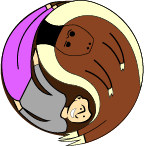The Short of It:
Life is sweet, but the sweetest taste has no flavor.

35. The Virtue of Benevolence.
Lay hold on the great form (of Tau), and the whole world will go to you. It will go to you, and suffer no injury; and its rest and peace will be glorious.
(If you have) music and dainties*, the passing stranger will stop (at your door).
Tau, in its passing out of the mouth, is weak and tasteless. If you look at it, there is nothing to fill the eye. If you listen to it, there is nothing to fill the ear. But if you use it, it is inexhaustible.
*Something good to eat.
35. ‘The Attribute of Benevolence.’
35.1 To [those] who [hold] in [their] hands the Great Image (of the invisible Tao), the whole world repairs. [People] resort to [them], and receive no hurt, but (find) rest, peace, and the feeling of ease.
35.2 Music and dainties* will make the passing guest stop (for a time). But though the Tao as it comes from the mouth, seems insipid and has no flavour, though it seems not worth being looked at or listened to, the use of it is inexhaustible.
*Something good to eat.
35. The Virtue of Benevolence.
35.1 “Who holdeth fast to the great Form, Of [them] the world will come in quest: For there we never meet with harm, There we find shelter, comfort, rest.”
35.2 Music with dainties* makes the passing stranger stop. But Reason, when coming from the mouth, how tasteless is it! It has no flavor. When looked at, there is not enough to be seen; when listened to, there is not enough to be heard. However, when used, it is inexhaustible.
*Something good to eat.

The Long of It:
The paradox of Chapter 35 is between something and nothing. The first stanza describes Tao as something tangible we can put our hands on. While the last stanza insists Tao is a flavorless, invisible, silent thing.
That’s the paradox we must live with. It’s easy to be distracted by the tangible, exciting products of balance (see Chap 34), but only the wisest know how to drink the sweet nectar of nothingness.
-TB
